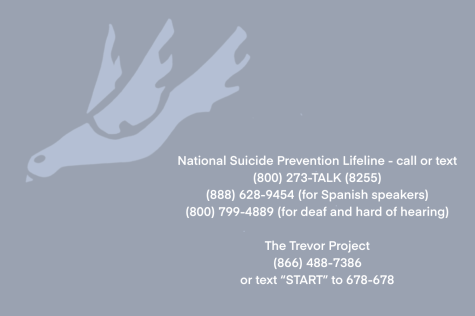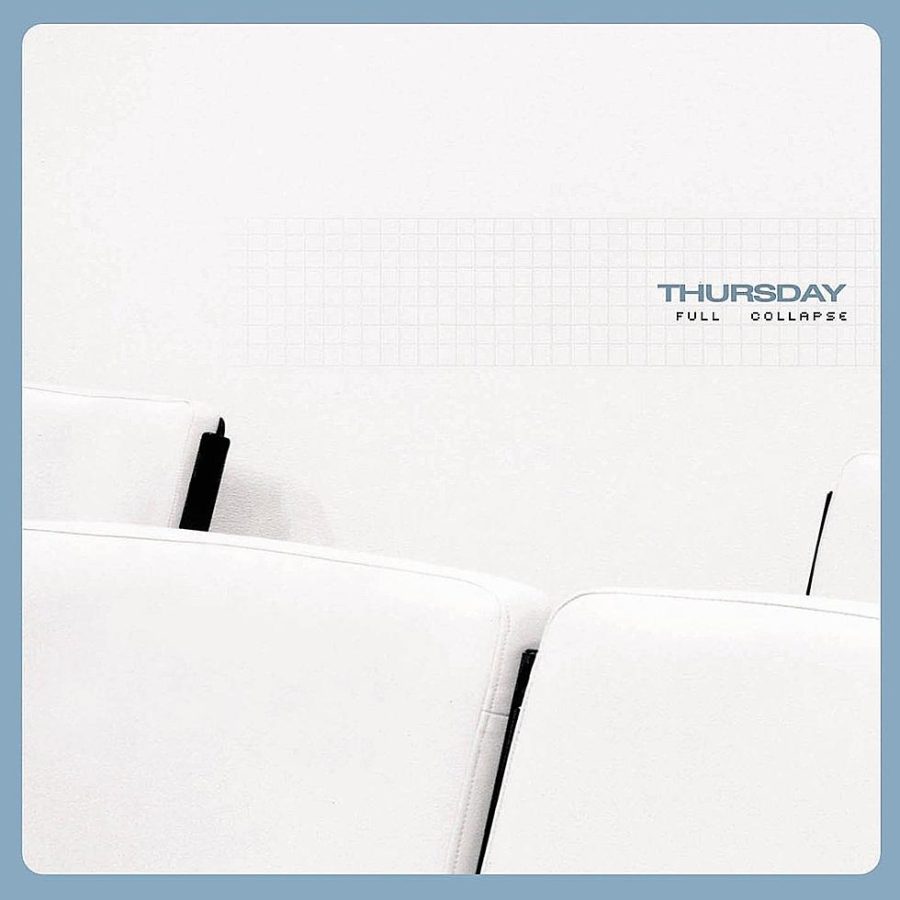Killer Klassix; Thursday- “Full Collapse”
Thursday paves the way for a sound rooted in aggression and relates to fans through moments of hardship and discontent, offering solace by melody.
November 21, 2022
As famous comic and screenwriter, Brian K. Vaughn stated in his work “Saga,” “you are unlike anyone who has ever existed, and that makes you exactly like everyone who has existed.” In a genre-collaborative sophomore effort, the band Thursday’s “Full Collapse” concentrates these sentiments and more to develop one of the most pivotal releases of the screamo-emo era of the early 2000s.
“Full Collapse” was released on April 10, 2001 and was the sophomore effort by Jersey, post-hardcore, emo quintet, Thursday. Released from the now defunct Chicago punk label Victory records, the album has an influential history and became a turning-point for hardcore music.
At the time, punk labels were signing pop punk and alternative bands, looking for the next big wave of musical nuance. New Jersey natives, Thursday took influence from numerous scenes and decided to take a chance and wrote 11 songs that incorporate punk, emo and hardcore influences, while also adding the aggressive tone of screaming to each song. The album is ideologically appealing with themes such as existence, sexuality, genocide, relationships and death. However, anyone can write about that stuff. Thursday paved the way for a sound rooted in aggression, pulling from influences such as Jawbreaker, Fugazu, Refused, The Cure and even Christian Metal acts such As Underoath and Norma Jean. As a result, the album relates to fans through moments of hardship and discontent, offering solace by melody.
The initiating track is titled “A00001” and is an atmospheric immersion into vocalist and writer Geoff Rickly’s own pontification of whether robots have the ability to dream or imagine based on man’s technological progressions in the early 2000s. There is no framing for the track except a single rowdy melody and Rickly’s vocals repeating three lines “We’ll all look the same someday/And even now the robot starts to think/I wonder what it dreams,” denoting how reliant and demanding man is of technology and how much society invests into computers. The track is less than a minute and already sets the album up for a thematic search for solace and answers regarding existence.
“Understanding in a Car Crash” acts as a titular and musical disruption of the previous track. There is a snare sound off composed of two energetic counts, followed by a punk-style groove for the track to be led by. Written in remembrance of two friends who perished in a drunk driving accident, Rickly’s lyrics are a push and pull between progression and sorrow.
Though I could write the rest of this review based on the lyrical poetics of this individual song, I’ll focus on the outro lyrics, “Staring at the setting sun(And it’s over)/No reason to come back again (In a flash)/ The twilight world in blue and white (And I’ll never)/The needle and the damage done (Ever understand)/I don’t want to feel this way forever (Understanding)(In a car crash)/A dead letter marked return to sender (In a car crash)/In a crash/(In a crash).” Between melodic and screaming vocals Rickly’s mental anguish shines through acknowledging a pivotal truth of life; life ends in an instant, and we may never truly understand how someone was taken from us, but we can learn from losing someone and let those who they left behind know how much their presence meant.
“A Hole in the World” is a genre explorative track and exhibits homage to Midwestern emo band Jawbreaker. As a personal favorite off the album, “A Hole in The World” speaks truth in a society heavily reliant on empty gestures and false actions to drive its points home. The song speaks of the fluidity of love and how it is an important driving factor in life. The composition of the song is tight-knit towards the beginning, but as the song develops it unravels from the natural structure and sheds the foundational sound; much like its subject matter.
The outro once again highlights Rickly’s lyrical intention, “Love is love is love is love is love/(There is no such thing as whole),” repeated, symbolically representative as a tenement; contrasting the ideal of a “full picture,” or what love should look like and exhibiting love in its purest form. By the end of the track the only thing that remains is chaos, blaring guitars, Rickly’s screams contrasting one over the other and a single piano lullaby resonating as the audible reminder of what love is in life.
“Cross Out The Eyes” is a thematic departure from Rickly’s perspective. In an attempt to write a song from the perspective of an individual, Rickly set out on an external exploration of existence. The result is one of the most pivotal screamo-emo songs of all time. The track begins with a cadence-style rhythmic pounding between two high and low tom drums, “A silent dance that we did into this hospital bed/Hear voices from another room/It happens all the time/But July in the sand/The leaves falling/And counting down our days to live/Drain the blood from this valentine.” Rickly’s melodic vocals explore mile points with a sentiment of futility. They are daunting sign-posts that alert the oncoming end. Musically the track exhibits some of the finer experimentations of emo and hardcore’s abilities with the bass actually leading the track for the entirety of the song with the guitar subtly introduced in a poly-rhythmic short solo and then fading back into the rhythms.
“Paris In Flames” is a heavy thematic track that exhibits the economically-driven, societal rejection of LGBTQ+ individuals. With near-metal sounding rhythm guitars and sung in a minor key, Rickly likens rejection of LGBTQ+ individuals to a form of genocide by injection. The needle is representative of two points, a means to an end, or means to hear the music, as is referenced by Rickly’s lyrics in the form of a record player. In this track, Rickly uses spoken word, stating “Here in this collapsed lung of a borough/There is no sunlight/The sunlight is manufactured in a windowless room/Distant and incoherent/Businessmen hang themselves,” highlighting the masterful poetics of Rickly’s writing, which materializes the ostracization on the basis of being of a different sexual orientation. The false sunlight in Rickly’s prose is symbolic of the lies of heteronormativity , to the point to where the only one sexual orientation can exist, falsely exhibited as the only one.
These are all experiences we have either gone through at one time or another, or have sympathized with. Our only vantage point to understanding one another is simply existing as human beings. That being said, we are not ever alone, or as alone as we think we are, and if we think we are alone in this world, it really puts some questionable thoughts in our head. I implore everyone who needs to talk, please reach out for help. No matter how alone I feel, how hurt I may be, or how heavy the rain feels when it pours, I know talking my feelings out and writing definitely helps me mentally.



















